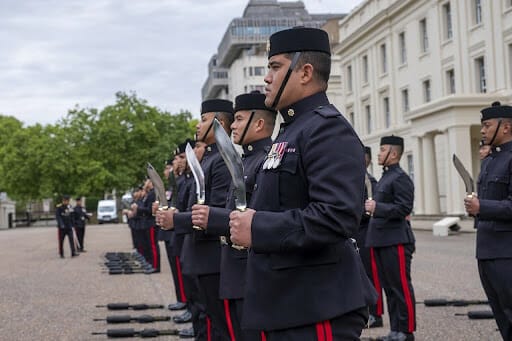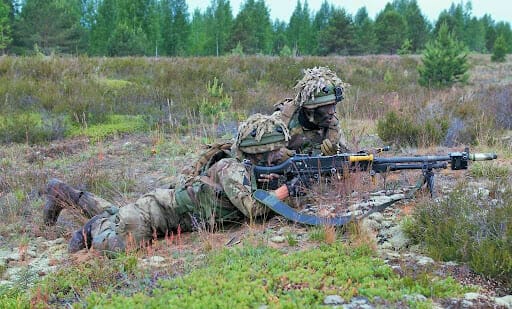
We’re frequently called upon to apologise for ‘Empire’ and to de-colonise everything in sight including our gardens, to spend significant sums of money in commissioning consultants to help us do so. Statues of imperial heroes are under threat from the baleful malice of ‘Woke’ vigilantes. I was nearly thrown out of Liverpool’s excellent civic museum for taking mild exception to their apologetic display on the Indian Mutiny (1857 – 1858) being badged as ‘The First Indian War of Independence’. Aside from the awful syntax, this is totally incorrect, that is not what this particular and awful conflict was about and the visitor is being deliberately misled.
History and heritage aren’t necessarily pretty. That imperial forces committed a ghastly slew of atrocities (as did both sides) during the course of the Mutiny, cannot and should not be denied. But denying or rewriting history is also a crime – ask any citizen of the former Soviet vassal states and they can tell you all about cultural distortion. And then there’s the Gurkhas!
On 8th June 2015 I attended a gala event to mark the 200th anniversary of the founding of the Regiment of Gurkhas, an original ‘Band of Brothers’. Presented by Joanna Lumley and Dan Snow in the presence of the Duke of Edinburgh, Prince of Wales, Prince Harry, HM the Sultan of Brunei and the CGS, it was a glittering event, featuring lively re-enactments of several famed Gurkha actions, starting with the Siege of Hindu Rao’s house during the Indian Mutiny, (see following chapter). This wasn’t just a celebration for the Gurkhas themselves and their families it was recognition of the vital role the Brigade has played in UK Defence for two centuries, through the rise and decline of empire and in two world wars, perhaps no more so than in 1940 when Britain was very short of allies indeed.
The show celebrated the role of Nepali Gurkhas in the service of the British Crown. This has been played out across the vast canvas of the Sub Continent, Afghanistan (three wars), North West and North East Frontiers, over the bloody killing fields of Flanders, Gallipoli, the Western Desert, Italy, Burma and out to the far distant Falklands in the South Atlantic. Few if indeed any of the world’s elite armed forces have ever spanned so much of the globe. Current serving soldiers follow a path trodden by their fathers, grandfathers and even great-grandfathers. There is no other comparable unit in any of the world’s armies, (with the obvious exception of the Indian Army), or one more respected and loved by the British.
After the terrible ordeal of Kohima in 1944, crucible of the fight against the Japanese, returning British and Indian army troops, stumbling back from the killing ground, were still divided into two orderly queues for the comforts of the NAAFI, where the ladies of empire were serving hot tea. Indian army formed on one side, British on the other. One of the starched helpers suggested Gurkhas should form up with the Indian soldiers: ‘Oh no miss’, retorted a Tommy sergeant; ‘them’s Gurkhas, they’re us….’

In 2016 I took my son in law’s Gurkha Company on a battlefield tour of Flanders and Artois. These young soldiers – many of whom had seen action in Afghanistan, would learn about the terrible war their great-grandfathers had fought just over a century earlier. Unlike many groups, even those from the MoD, they were very keen to understand and to show their respect and reverence for their ancestors who had fought so hard and bled so freely so very far from home. It was a profoundly moving experience for all of us.
Despite the continuing popularity of the Gurkhas, (their profile much heightened by the stellar representations of Joanna Lumley) and their role in the UK’s 21st Century campaigns, very little of substance has been written since John Parker’s The Gurkhas in 1998* and then Chris Bellamy’s The Gurkhas – Special Force in 2011, together with personalised accounts such as Sergeant Kailash Limbu’s Gurkha. Anecdotally, other nations do not necessarily share British enthusiasm for the Gurkhas. In both France and Belgium whilst leading Gurkha groups on tour, I’ve encountered some casual racism. In one hotel they were sneeringly referred to as ‘Mongols’ – a slur the Gurkhas found quite funny as they do indeed have Mongol ancestry.
Some would describe Gurkhas as mercenaries, a term heavy with disdain but this would be very unfair. Gurkhas are a recognised part of the UK and Indian Army regular establishments and in the case of Britain, have been so for over two centuries. They are unique, steadfastly loyal, infinitely adaptable and hugely resilient. This thorny point is well covered in Tony Gould’s penetrating study, from the late nineteen-nineties. They have served in most of Britain’s many conflicts since 1816 including both world wars and at the time of writing, the Brigade is being expanded. The new wars of this new millennium will be very different to old post-imperial and brush-fire strife, adaptability is order of the day and the need for Gurkhas as a vital component of Britain’s armed forces will not diminish, quite the reverse.
‘Johnny Gurkha’ is a part of Empire, however unfashionable that expression may now be. The joy and humour of Kipling has been suppressed by the bitter tide of political correctness and I’m afraid I make no apologies for swimming against that pernicious flood. Since the time they first took the colours, the Gurkhas have been the stuff of Boys Own stories and theirs is one of constant high adventure.
‘Traditions matter. In themselves they count for little, but they combine to form part of the identity that makes our Regiment what it is. In our line of work, we have to do things that are far from normal – our Regiment provides us with some of the reference points that we need to bring sense into chaos. It is not easy to regain tradition once lost, so we must fight to keep it’.
‘It provides the framework for our relationships with one another which in turn serve us well in peace and on operations. We should also be extremely proud to be a part of the Royal Gurkha Rifles, and a way of showing that pride is to uphold the traditions that our forebears established. We call this kaida. Support Company kaida is about FAMILY (Fitness, Agility, Mutual Support, Initiative, Leadership and You) but it is underpinned by our kaida. History is like map reading- how do we know where we are, if we do not know where we came from, and how do we are going if we do not know where we are?’
Fifteen miles north of Kathmandu stands the town of Gorkha, a high and imposing place with the sweeping, almost eerie immensity of the Annapurna Range behind. Crowning the settlement, nearly 1,500 metres above sea level, is the Gorkha Durbar, both palace and fortress: complex and mysterious. It resonates still with a level of cultural intensity which must appear utterly alien to the west. Yet this is where the Gurkha, (originally ‘Goorkha’), story really begins. It is a very ancient citadel even though the most recent monarch still came here and added a very 21st century helipad for his convenience!
Nepal has changed a great deal in the last fifty or sixty years and yet, in some ways, not at all. Even in the late twentieth century the remote shut-in kingdom had a kind of Shangri-La quality, as backward and squalid as it would ever be romantic and young Gurkhas came down out of the hills from a tribal society largely unchanged for centuries. In the west, since the advent of the Industrial Revolution, we have conceived the notion of continual, never ending material progress, fuelled by technological innovation, a new cultural norm our own rural ancestors could never have imagined. Nor could the Gurkhas, their society is more akin to our eighteenth century agrarian past. Their comprehension, world view and beliefs are formed from as very different mould.
On 16 November 1814, Lord Moira, Governor-General of Bengal, took the Company to war against Nepal. It was a very tough fight. Despite the overwhelming strength of British forces, the ‘Goorkhas’ resisted and made John Company fight for every pass and ragged mountain fort. Peace was agreed in March 1816. The House of Gorkha lost some ground but was amply compensated. Both sides had developed a considerable respect for each other. Moreover, the British had appreciated that these tough mountain fighters would make excellent soldiers.
A partnership was born. Goorkhas became enthusiastic recruits and very soon, trusted allies. There’s a kind of parallel here with Scottish highlanders. During the Jacobite Risings in Britain (1689 – 1746) the recusant or Tory clans were viewed with a mix of contempt, fear and loathing. It was Pitt the Elder who, a decade after Culloden, had the idea of recruiting them into the British Army and using them as shock troops in emerging colonial wars – Gurkhas and highlanders would find they had much in common in due course.
By John Sadler, British historian.
